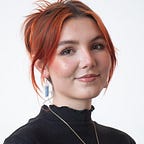Eating Disorder to Anti-Diet
In 2013, Sydney Lee would tune out in all of middle school classes. That year was really hard for her. She sat hunched over her computer screen as she typed away.
“That was all I did,” she told me. “I would sit in class and research diets and exercises to make me skinnier.”
“I would sit in class and research diets and exercises to make me skinnier.”
Orthorexia had consumed her life by the time she was in middle school.
“Someone with orthorexia may have very rigid rules around food,” says Kimberly Stevens, an eating disorder therapist and researcher. “They might be obsessed with the purity of their food. For example, they can’t have sugar or processed foods.”
Growing up she idolized her mother. A woman who kept diet books on the shelves and always made remarks about her body.
Her mom was a product of her time. “She grew up in the ’90s so that was when ‘heroin chic’ was the big thing,” Lee says of her mother. “That was just the beauty standard, so she never acknowledged it and that definitely added into my eating disorder.”
Since before she could conceptualize the way she looked the thin ideal was ingrained in her head by the person she loved the most.
“Someone might be biologically prone to develop orthorexia, but if they are in a family that is obsessing over the ‘right foods,’ then it is much more likely,” says Stevens.
The concoction of genetics and the culture that surrounded her is what caused her downward spiral into orthorexia. These were the years where her body image was her top priority
“That was the only way I knew how to measure my self worth,” Lee described as she sat in her dorm at the University of Denver.
She was underweight, but no one ever said a thing about her thin stature — nothing seemed wrong.
“Someone might be biologically prone to develop orthorexia, but if they are in a family that is obsessing over the “right foods,” then it is much more likely.”
“No one really cared that much because eating healthy and exercising are perceived as good things, but I was obsessed with it. It was the only thing I could think about,” said Lee.
According to an article in Healthline, “it can be hard to differentiate between orthorexia and a normal preoccupation with healthy eating.” Lee herself even noted this fact when speaking on her orthorexia.
She was just a kid when she worried the most about food. Her life was structured around these strict rules that she could not seem to escape.
“Even when I would bake cookies I would put certain ingredients in to help me lose weight,” scoffed Lee as she recounts this time. “I never once let myself make normal chocolate chip cookies, not even once.”
“I never once let myself make normal chocolate chip cookies, not even once.”
Images of her physical state only exist within her memories. She shied away from every camera out of fear of herself and others judgement.
“I have no pictures of myself from that time,” Lee recalls. “I would not let anyone take any pictures of me because I thought I looked fat in all of them.”
She thought she was doing the right thing, but her health obsession was not making her feel any better about herself.
“I was severely depressed all throughout middle school because of my eating disorder,” Lee said. “I hated myself because I hated my body.”
“I hated myself because I hated my body.”
She knew it was time for her to recover, but she did not have any resources or professional help to do so.
“Recovery occurred with a shift in my mentality,” said Lee on the start of her recovery. “I realized that people do not view me the way I view myself.”
Lee notes that this was a very unconventional way to recover and does not recommend it to everyone, but changing her perspective helped her the most.
“There isn’t one beauty standard. You do not have to look a certain way to be beautiful.”
“Eating disorder treatment is not accessible enough. It is expensive, time, intensive, and requires specialized treatments. “As a field we recognize this as an issue,” mentioned Stevens.
Stevens gives many recommendations on what people can do if they do not have access to treatment. One of them is through a very accessible option — the internet.
“Online there are a ton of great resources. The first thing I would recommend is unfollowing everyone who promotes diets and weight loss,” recommends Stevens. “The second thing I would recommend is regularly eating. It is the number one thing someone with an eating disorder needs to do in order to get better.”
Once Lee was cognizant of her unhealthy habits, it was a lot easier for her to come to terms with her eating disorder and let go of her food rules.
“I go out and eat with friends and actually allow myself to get fast food with them,” Lee said smiling. “Junk food is something I never allowed myself to eat, and now I can eat it and not feel any guilt.”
Lee’s quality of life changed for the better after she liberated herself from her eating disorder.
“I was finally able to measure my self worth on something that was not my body,” said Lee in a much happier tone. “There isn’t one beauty standard. You do not have to look a certain way to be beautiful.”
Written by Emerson Drewes who can be reached at edrewes@nevada.unr.edu.
